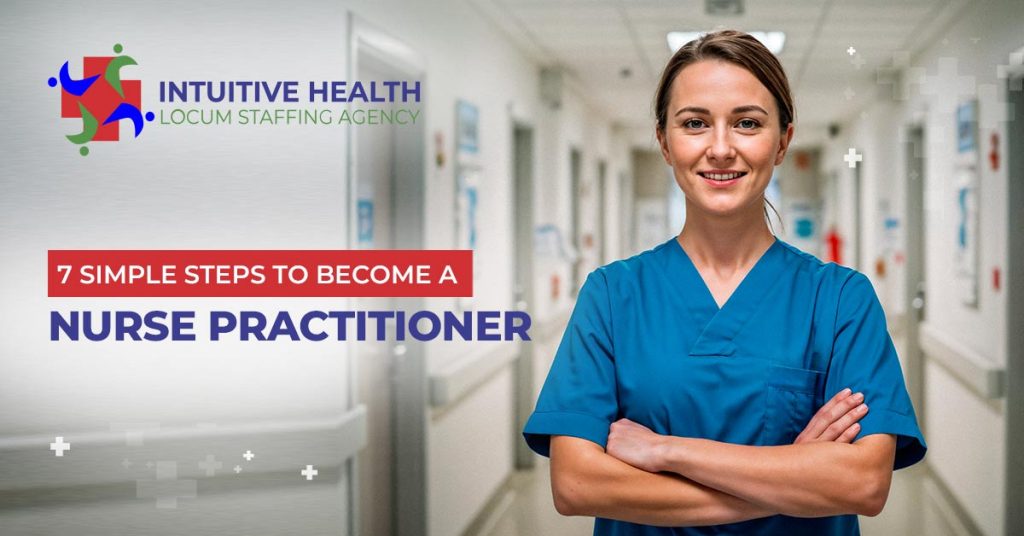One of the most rewarding and fulfilling careers in healthcare is becoming a Nurse Practitioner (NP). Nurse Practitioners have a vital role in advanced healthcare as they bridge the gap between registered nurses and physicians. They provide primary care, manage chronic conditions, prescribe medications, and support patients through some of life’s most challenging health journeys.

If you’re considering pursuing this career path, learning about it can be helpful. In this blog, we’ll explore the steps it takes to become an NP while discussing the job demand and career outlook.
What Does a Nurse Practitioner Do?
A Nurse Practitioner is an advanced practice registered nurse (APRN) with graduate-level training that allows them to diagnose illnesses, prescribe medications, order tests, and develop treatment plans. Unlike Registered Nurses (RNs), who focus primarily on delivering patient care under a physician’s guidance, NPs often work independently and can even serve as a patient’s primary care provider in some cases.
NPs work across a variety of settings, including family practice clinics, hospitals, emergency departments, specialty offices, and even through telehealth platforms. They fill critical roles in family medicine, pediatrics, psychiatric care, acute care, and women’s health.
The scope and demand of practice for NPs vary by state.
Some states give full practice authority to nurse practitioners, meaning NPs can operate without physician supervision, while others require a collaborative agreement. Either way, NPs consistently rank among the most trusted and demanded professionals in healthcare because of their patient-centered approach and clinical expertise.
Suggested Read: Top 10 High-Demand Health Department Jobs In the USA
How to Become a Nurse Practitioner
Here are the 7 steps you must follow if you aspire to become a practicising nurse.
Step 1: Undergraduate Degree, Bachelor of Science in Nursing (BSN)
The first step in the journey begins with education. Most aspiring Nurse Practitioners start with a Bachelor of Science in Nursing (BSN). This four-year degree program combines classroom learning with hands-on clinical rotations. Students take courses in anatomy, microbiology, health assessment, pharmacology, and evidence-based practice, while also gaining practical experience in hospitals and community health settings.
For those who already hold a non-nursing bachelor’s degree, there are Accelerated BSN programs that condense coursework into 12–18 months. These fast-track options help career changers enter nursing without starting from scratch.
If pursuing a traditional BSN feels out of reach, another pathway is to first become a Registered Nurse through an Associate Degree in Nursing (ADN) and then complete an RN-to-BSN bridge program. Many universities, such as Chamberlain University or Arizona State University, offer fully online RN-to-BSN programs designed for working nurses.
No matter the route, graduating from an accredited nursing program approved by the Accreditation Commission for Education in Nursing (ACEN) or the Commission on Collegiate Nursing Education (CCNE) ensures eligibility for licensure and sets a solid foundation for graduate-level study.
Step 2: Obtain RN Licensure and Clinical Experience
After completing a BSN, the next milestone is becoming a licensed Registered Nurse. To do this, graduates must pass the National Council Licensure Examination for Registered Nurses (NCLEX-RN). This standardized test evaluates knowledge in areas such as safe patient care, pharmacology, and clinical judgment.
Once licensed, you must get hands-on clinical experience. Most Nurse Practitioner programs prefer applicants with one to three years of professional nursing practice. In these years, nurses get valuable experience treating patients, developing strong decision-making skills, and collaborating with different members of the healthcare team.
Working in areas such as primary care, intensive care units, emergency departments, or pediatric wards allows nurses to sharpen their skills while exploring potential specialties. This experience not only strengthens applications to graduate programs but also provides the confidence needed to take on advanced responsibilities as an NP.
Step 3: Pursue a Graduate-Level NP Program
Graduate-level education is the cornerstone of becoming a Nurse Practitioner. There are two main degree options:
- Master of Science in Nursing (MSN): Generally takes two to three years to complete and is the minimum requirement to practice as an NP. Programs include advanced coursework in health assessment, pharmacology, and pathophysiology, along with 500–700 hours of supervised clinical practice.
- Doctor of Nursing Practice (DNP): This one’s a doctoral degree that emphasizes clinical leadership, healthcare policy, and evidence-based practice. A DNP program often takes three to four years and is becoming increasingly preferred for advanced roles.
Many universities, such as Duke University, Vanderbilt University, and Johns Hopkins University, offer nationally recognized NP programs. These schools provide specialized tracks in Family Practice, Adult-Gerontology, Pediatric, and Psychiatric Mental Health.
Applicants usually need a BSN, an active RN license, letters of recommendation, and a competitive GPA. Some schools also require the GRE, although this is becoming less common. Choosing between MSN and DNP depends on long-term career goals. An MSN degree is suitable for individuals who are eager to begin clinical practice, whereas a DNP is better aligned with long-term goals in leadership, academic roles, or health policy.
Step 4: Choose Your Area of Specialization
Selecting a specialty allows you to focus your NP career on the areas of healthcare that matter most to you and fit your professional goals. Specialties allow NPs to focus their practice and deepen their expertise to get better opportunities. According to the Journal for Nurse Practitioners, NPs, particularly specialty care NPs, are expected to grow much faster than physicians in many fields. Here are a few specialities you can consider:
- Family Nurse Practitioner (FNP): Provides primary care for patients across the lifespan.
- Adult-Gerontology Nurse Practitioner (AGNP): These professionals focus on adult and elderly patient populations.
- Pediatric Nurse Practitioner (PNP): Provides specialized treatment and care to infants, children, and adolescents.
- Psychiatric-Mental Health Nurse Practitioner (PMHNP): Delivers mental health services, including therapy and medication management.
- Acute Care Nurse Practitioner (ACNP): Treats patients with complex, critical, or unstable conditions.
- Women’s Health Nurse Practitioner (WHNP): Provides reproductive and gynecological care.
To select the right specialty, you should balance passion, job outlook, and lifestyle. For example, an FNP often enjoys a broad scope of practice and high demand in community health, while a PMHNP may benefit from the growing need for mental health providers nationwide.
Suggested Read: What is the Highest Paid Locum Tenens Specialty?
Step 5: Pass a National Certification Exam
After completing graduate education, the next step is national certification. Certification helps to verify your expertise and gives you the eligibility for state licensure.
Two leading organizations oversee NP certification:
- American Academy of Nurse Practitioners (AANP)
- American Nurses Credentialing Center (ANCC)
Exams typically include multiple-choice questions that assess clinical knowledge, diagnostic reasoning, and patient management. Preparing for certification requires reviewing coursework, completing practice questions, and sometimes attending review courses offered by professional organizations.
Successfully passing certification demonstrates readiness to practice independently and ensures compliance with national standards.
Step 6: Obtain State NP Licensure
Certification alone does not allow practice; you must get state licensure for that. Each state has its own Board of Nursing with unique requirements. Some states grant Full Practice Authority, allowing NPs to work independently, while others require collaborative agreements with physicians.
The licensure process generally involves submitting proof of certification, educational transcripts, background checks, and fees. NPs must also maintain ongoing continuing education credits to renew their license regularly.
Understanding your state’s scope of practice is crucial. For example, states like Washington and Oregon grant complete independence, while states such as Texas and California still require physician oversight.
Step 7: Start Practicing as a Nurse Practitioner
With certification and licensure in hand, it’s time to begin practicing. Nurse Practitioners work in diverse settings like family practice clinics, hospitals, specialty practices, urgent care centers, and increasingly, telehealth services.
The Bureau of Labor Statistics says that the demand for Nurse Practitioners is projected to grow by over 35% this decade — much faster than the average for all occupations. Nurse Practitioners earn highly competitive salaries, with averages topping $132,000 a year, though exact pay depends on specialty and location.
The role also provides flexibility. Many NPs balance clinical practice with teaching, research, or leadership positions. This variety allows for career growth while making a lasting impact on patient care.
Top Skills for a Successful Nurse Practitioner Career
Education and clinical practice are crucial as they lay the groundwork, but thriving as an NP also requires key personal and professional traits. These include:
- Critical Thinking: Using clinical knowledge and evidence to make sound decisions in high-pressure or complicated situations.
- Communication: Clearly conveying any information to patients, listening to them actively, and collaborating effectively with colleagues and patients.
- Compassion: Caring for patients with understanding and respect for their cultural differences and personal choices.
- Adaptability: Managing diverse patient populations in fast-changing healthcare environments.
- Leadership: Guiding care teams and influencing healthcare policy.
These skills, combined with advanced education, ensure NPs provide safe, patient-centered care that improves outcomes across communities.
Suggested Read: The Essential Skills Needed for Health Department Jobs
Career Development as Nurse Practitioner
Becoming a Nurse Practitioner is just the beginning. Career advancement opportunities abound for those who want to grow further.
- Pursue Subspecialties: Focusing on areas such as cardiology, oncology, dermatology, or emergency care helps NPs expand their expertise and advance their careers.
- Transition from MSN to DNP: Many programs offer post-master’s DNP pathways to build leadership and research skills.
- Engage in Teaching: Many NPs become faculty in nursing schools, shaping the next generation of providers.
- Policy and Leadership Roles: Nurse Practitioners can shape healthcare policy, serve on professional boards, and take on leadership positions within hospitals and clinics.
Continuous education, professional memberships, and mentorship are essential to stay ahead in the nursing field.
If you’re an NP looking for a career upgrade, you can look into job opportunities for Nurse Practitioners in the USA.
Advance Your Nurse Practitioner Career With Intuitive Health Services
Becoming a Nurse Practitioner can be the most rewarding decision in your healthcare journey. However, finding the right opportunities to put your skills into practice is just as important as the education itself, and most people find this part tricky. That’s where Intuitive Health Services comes in.
We provide trusted medical staffing solutions and connect Nurse Practitioners with hospitals, clinics, and healthcare organizations that value their expertise. From first-time Nurse Practitioners to seasoned healthcare professionals, we provide personalized placements that match your skills, career goals, and lifestyle.
Ready to find the right Nurse Practitioner role for you? Connect with Intuitive Health Services today and start building a career that makes a difference.

